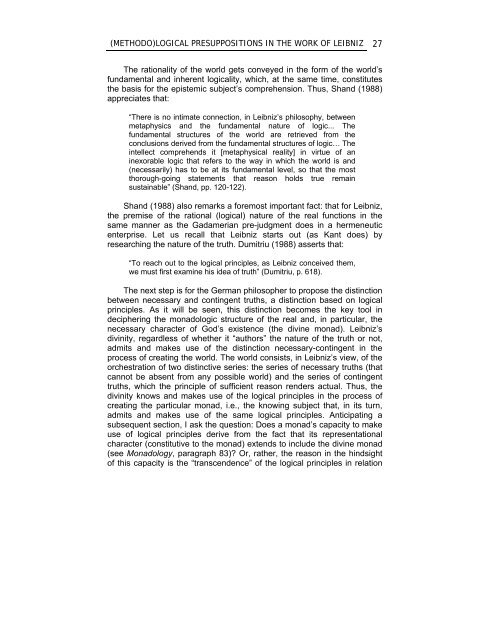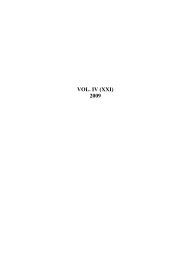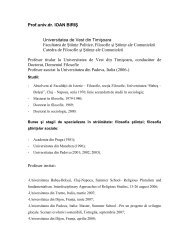analele universităţii de vest din timişoara annales universitatis ...
analele universităţii de vest din timişoara annales universitatis ...
analele universităţii de vest din timişoara annales universitatis ...
Create successful ePaper yourself
Turn your PDF publications into a flip-book with our unique Google optimized e-Paper software.
(METHODO)LOGICAL PRESUPPOSITIONS IN THE WORK OF LEIBNIZ 27<br />
The rationality of the world gets conveyed in the form of the world’s<br />
fundamental and inherent logicality, which, at the same time, constitutes<br />
the basis for the epistemic subject’s comprehension. Thus, Shand (1988)<br />
appreciates that:<br />
“There is no intimate connection, in Leibniz’s philosophy, between<br />
metaphysics and the fundamental nature of logic... The<br />
fundamental structures of the world are retrieved from the<br />
conclusions <strong>de</strong>rived from the fundamental structures of logic… The<br />
intellect comprehends it [metaphysical reality] in virtue of an<br />
inexorable logic that refers to the way in which the world is and<br />
(necessarily) has to be at its fundamental level, so that the most<br />
thorough-going statements that reason holds true remain<br />
sustainable” (Shand, pp. 120-122).<br />
Shand (1988) also remarks a foremost important fact: that for Leibniz,<br />
the premise of the rational (logical) nature of the real functions in the<br />
same manner as the Gadamerian pre-judgment does in a hermeneutic<br />
enterprise. Let us recall that Leibniz starts out (as Kant does) by<br />
researching the nature of the truth. Dumitriu (1988) asserts that:<br />
“To reach out to the logical principles, as Leibniz conceived them,<br />
we must first examine his i<strong>de</strong>a of truth” (Dumitriu, p. 618).<br />
The next step is for the German philosopher to propose the distinction<br />
between necessary and contingent truths, a distinction based on logical<br />
principles. As it will be seen, this distinction becomes the key tool in<br />
<strong>de</strong>ciphering the monadologic structure of the real and, in particular, the<br />
necessary character of God’s existence (the divine monad). Leibniz’s<br />
divinity, regardless of whether it “authors” the nature of the truth or not,<br />
admits and makes use of the distinction necessary-contingent in the<br />
process of creating the world. The world consists, in Leibniz’s view, of the<br />
orchestration of two distinctive series: the series of necessary truths (that<br />
cannot be absent from any possible world) and the series of contingent<br />
truths, which the principle of sufficient reason ren<strong>de</strong>rs actual. Thus, the<br />
divinity knows and makes use of the logical principles in the process of<br />
creating the particular monad, i.e., the knowing subject that, in its turn,<br />
admits and makes use of the same logical principles. Anticipating a<br />
subsequent section, I ask the question: Does a monad’s capacity to make<br />
use of logical principles <strong>de</strong>rive from the fact that its representational<br />
character (constitutive to the monad) extends to inclu<strong>de</strong> the divine monad<br />
(see Monadology, paragraph 83)? Or, rather, the reason in the hindsight<br />
of this capacity is the “transcen<strong>de</strong>nce” of the logical principles in relation




